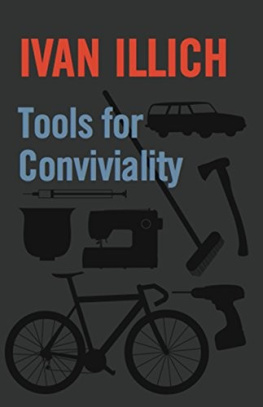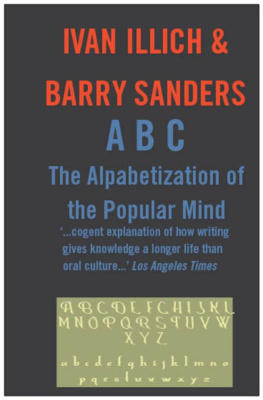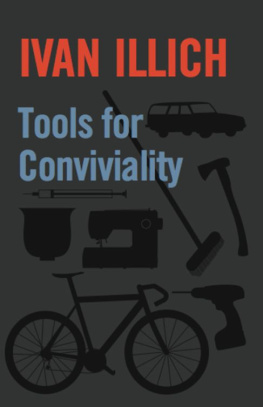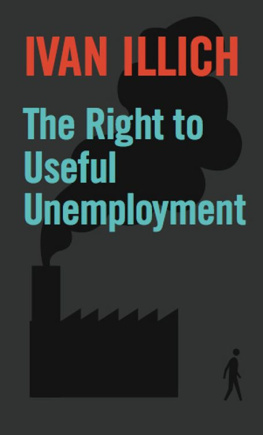Ivan Illich - Tools for Conviviality
Here you can read online Ivan Illich - Tools for Conviviality full text of the book (entire story) in english for free. Download pdf and epub, get meaning, cover and reviews about this ebook. year: 1973, publisher: Harper & Row, genre: Politics. Description of the work, (preface) as well as reviews are available. Best literature library LitArk.com created for fans of good reading and offers a wide selection of genres:
Romance novel
Science fiction
Adventure
Detective
Science
History
Home and family
Prose
Art
Politics
Computer
Non-fiction
Religion
Business
Children
Humor
Choose a favorite category and find really read worthwhile books. Enjoy immersion in the world of imagination, feel the emotions of the characters or learn something new for yourself, make an fascinating discovery.
- Book:Tools for Conviviality
- Author:
- Publisher:Harper & Row
- Genre:
- Year:1973
- Rating:4 / 5
- Favourites:Add to favourites
- Your mark:
- 80
- 1
- 2
- 3
- 4
- 5
Tools for Conviviality: summary, description and annotation
We offer to read an annotation, description, summary or preface (depends on what the author of the book "Tools for Conviviality" wrote himself). If you haven't found the necessary information about the book — write in the comments, we will try to find it.
Tools for Conviviality — read online for free the complete book (whole text) full work
Below is the text of the book, divided by pages. System saving the place of the last page read, allows you to conveniently read the book "Tools for Conviviality" online for free, without having to search again every time where you left off. Put a bookmark, and you can go to the page where you finished reading at any time.
Font size:
Interval:
Bookmark:
The multidimensional analysis of ceilings for industrial growth was first formulated in a Spanish document co-authored by Valentina Borremans and myself and submitted as a guideline for a meeting of two dozen Chilean socialists and other Latin Americans at CIDOC (the Center for Intercultural Documentation) in Cuernavaca, Mexico. The next version was presented at the Zeno Symposium organized by Professor Richard Wollheim in Cyprus. It was published in Esprit, Paris, March 1972, with criticisms by Th. Adam, Pierre Caussat, J. P. Chevenement, Paul Fraisse, Yves Goussault, Pierre Kende, J. W. Lapierre, Michel Panoff, Henri Pequignot, Jean Marie Domenach, and Paul Thibaud. A third version served me and my deceased friend Greer Taylor as the basis for our participation in the Canadian Conference on the Law in January 1972 in Ottawa. Comments by David Weisstub, Nils Christie, Allen M. Linden, J. G. Castel, H. w. Arthurs, Jos Antonio Viera-Gallo, J. C. Smith, and Bonaventura de Sousa Santos, and other critical papers by jurists, will be published in mid-1973 in Toronto. During the summer of 1972, participants in my CIDOC seminar contributed very helpful papers. I'm especially grateful for the assistance of John Bradley, John Brewer, Jos? Maria and Veronica Bulnes, Martin Cohen, Irene Curbelo de Diaz, Dennis Detzel, Joseph Fitzpatrick, Amnon Goldworth, Conrad Johnson, Hartmut von Hentig, John MacKnight, Michael Maccoby, Leslie Marcus, Francisco Mir6 Quesada, Marie-No'lle Monteil, William Ophuls, Marta H. Reed, Everett Reimer, Francisco Varela, Etienne Verne, Jacques Vidal and German Zabala. Dennis Sullivan has patiently and critically assisted me in editing the final version. After I had delivered this manuscript to the publisher, I received valuable suggestions from J.P. Naik and his friends in India. These have seeped into thetext to the extent this can happen in the correction of proofs. Second only to Valentina Borremans and Greer Taylor, Heinz von Foerster, Erich Fromm, Hermann Schwember and Abrahn Diaz Gonzales have exerted the most decisive influence on the formulation of my ideas.
During the next several years I intend to work on an epilogue to the industrial age. I want to trace the changes in language, myth, ritual, and law which took place in the current epoch of pack-aging and of schooling. I want to describe the fading monopoly of the industrial mode of production and the vanishing of the industrially generated professions this mode of production serves.
Above all I want to show that two-thirds of mankind still can avoid passing through the industrial age, by choosing right now a postindustrial balance in their mode of production which the hyperindustrial nations will be forced to adopt as an alternative to chaos. To prepare for this task I submit this essay for critical comment.
In its present form this book is the result of conversations at CIDOC in Cuernavaca during the summer of 1972. Participants in my seminar will recognize their ideas, and often their words. I ask my collaborators to accept my sincere thanks, especially for their written contributions.
This essay has become too long to appear as an article and too intricate to be read in several installments. It is a progressreport. I respectfully thank Ruth Nanda Anshen for issuing this tract as a volume, in World Perspectives, published by Harper & Row.
For several years at CIDOC in Cuernavaca we have conducted critical research on the monopoly of the industrial mode of production and have tried to define conceptually alternative modes that would fit a postindustrial age. During tine late sixties this research centered on educational devices. By 1970 we had found that:
1. Universal education through compulsory schooling is not possible.
2. Alternative devices for the production and marketing of mass education are technically more feasible and ethically less tolerable than compulsory graded schools. Such new educational arrangements are now on the verge of replacing traditional school systems in rich and in poor countries. They are potentially more effective in the conditioning of job-holders and consumers in an industrial economy. They are therefore more attractive for the management of present societies, more seductive for the people, and insidiously destructive of fundamental values.
3. A society committed to high levels of shared learning and critical personal intercourse must set pedagogical limits on industrial growth.
I have published the results of this research in a previous volume of World Perspectives, entitled Deschooling Society. I clarified some of the points left ill defined in that book by writing an article published in the Saturday Review of April 19, 1971.
Our analysis of schooling has led us to recognize the mass production of education as a paradigm for other industrial enterprises, each producing a service commodity, each organized as a public utility, and each defining its output as a basic necessity. At first our attention was drawn to the compulsory insurance of professional health care, and to systems of public transport, which tend to become compulsory once traffic rolls above a certain speed. We found that the industrialization of any service agency leads to destructive side effects analogous to the unwanted secondary results well known from the overproduction of goods. we had to face a set of limits to growth in the service sector Of any society as inescapable as the limits inherent in the industrial production of artifacts. we concluded that a set of limits to industrial growth is well formulated only if these limits apply both to goods and to services which are produced in an industrial mode. So we set out to clarify these limits.
I here submit the concept of a multidimensional balance of human life which can serve as a framework for evaluating man's relation to his tools. In each of several dimensions of this balance it is possible to identify a natural scale. When an enterprise grows beyond a certain point on this scale, it first frustrates the end forwhich it was originally designed, and then rapidly becomes a threat to society itself. These scales must be identified and the parameters of human endeavors within which human life remains viable must be explored.
Society can be destroyed when further growth of mass production renders the milieu hostile, when it extinguishes the free use of the natural abilities of society's members, when it isolates people from each other and locks them into a man-made shell, when it undermines the texture of community by promoting extreme social polarization and splintering specialization, or when cancerous acceleration enforces social change at a rate that rules out legal, cultural, and political precedents as formal guidelines to present behavior. Corporate endeavors which thus threaten society cannot be tolerated. At this point it becomes irrelevant whether an enterprise is nominally owned by individuals, corporations, or the slate, because no form of management can make such fundamental destruction serve a social purpose.
Our present ideologies are useful to clarify the contradictions which appear in a society which relies on the capitalist control of industrial production; they do not, however, provide the necessary framework for analyzing the crisis in the industrial mode of production itself. I hope that one day a general theory of industrialization will be stated with precision, that it will be formulated in terms compelling enough to withstand the test of criticism. Its concepts ought to provide a common language for people in opposing parties who need to engage in the assessment of social programs or technologies, and who want to restrain the power of man's tools when they tend to overwhelm man and his goals. Such a theory should help people invert the present structure of major institutions. I hope that this essay will enhance the formulation of such a theory.
Font size:
Interval:
Bookmark:
Similar books «Tools for Conviviality»
Look at similar books to Tools for Conviviality. We have selected literature similar in name and meaning in the hope of providing readers with more options to find new, interesting, not yet read works.
Discussion, reviews of the book Tools for Conviviality and just readers' own opinions. Leave your comments, write what you think about the work, its meaning or the main characters. Specify what exactly you liked and what you didn't like, and why you think so.









